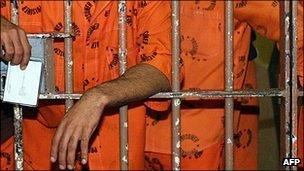South African inmates ask for circumcision to fight HIV
- Published

South Africa's Prisoners Human Rights welcomed the move as long as inmates were properly informed
The authorities in South Africa's KwaZulu-Natal province say they have been "overwhelmed" by the number of prisoners wanting to be circumcised to help combat the spread of HIV.
Some studies suggest being circumcised can help men halve their chances of contracting the Aids virus.
KwaZulu-Natal has one of the highest HIV infection rates in South Africa.
Provincial health minister, Sibongiseni Dhlomo, said only volunteers were being circumcised.
"We've had more people wanting to be circumcised than our resources can actually manage. In fact, we're overwhelmed," Mr Dhlomo told the BBC.
He said the targeting of prisoners was part of a wider programme to circumcise sexually-active men in the province, and that the idea to extend it to prisons had come from the inmates themselves.
"We had gone into prisons to talk about HIV and condoms and testing. They said: 'But why aren't we in the programme?'," Mr Dhlomo said.
He said about 150 prisoners had already been circumcised in one prison, Qalakabusha, and that more volunteers had now come forward from the same establishment.
Mr Dhlomo said that prisoners were also being advised to use condoms as well as being circumcised.
'Spreading like wildfire'
South Africa's Prisoners Human Rights Organisation told the BBC it welcomed the move as long as inmates were properly informed.
Spokesman Golden Miles Bhudu said it might be in the best interest of inmates.
"It may help fight the scourge as HIV/Aids, which appears to be spreading like wildfire in South African prisons," he said.
More than 5.7 million people in South Africa live with the HIV virus - more than in any other country.
The Zulu king, Goodwill Zwelithini, recently lifted a traditional ban on circumcision, in a bid to fight HIV.
It had been prohibited by King Shaka in the 19th Century because he said it robbed him of young warriors for months at a time.
Dr Dhlomo said that since April, when the health authorities in KwaZulu-Natal began the programme, more than 10,000 men had opted to be circumcised.
The minister said the department had a target of 2.5 million circumcisions by June 2014.